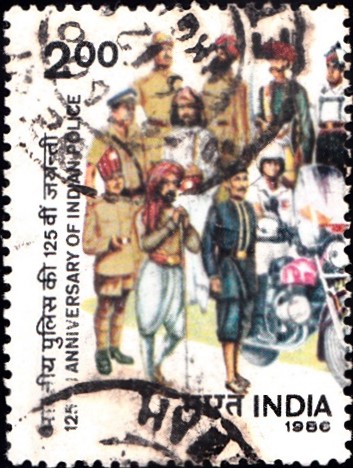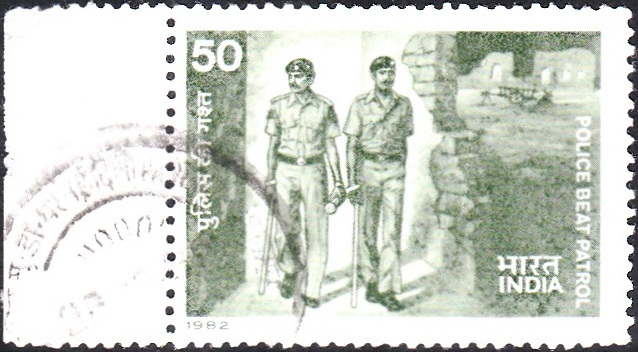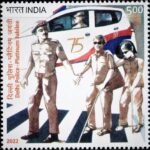
Indian Police 1986
Complete set of 2 nos of commemorative postage stamps on the 125th Anniversary of the Indian Police :

 Issued by India
Issued by India
Issued on Oct 21, 1986
Issued for : The Department of Posts is happy to issue a Se-tenant set of two commemorative stamps on the 125th anniversary of Indian Police.
Description of Designs : The Se-tenant set of two stamps of 200 p and 150 p commemorating the 125th anniversary of Indian Police have been designed by Shri Ahmed Ali. The cancellation design has been prepared by Miss Nenu Bagga. The First Day Cover has been prepared by Mrs. Alka Sharma based on the material given by BPRD.
Type : Stamps, Postal Used
Colour : Multi colour
Denomination : 150 & 200 Paise
Overall size : 3.91 x 5.80 cms.
Printing size : 3.55 x 5.08 cms.
Perforation : 13 x 13
Paper : Imported unwater–marked P.G. coated stamp paper
Number printed : 15,00,000
Number per issue sheet : 40
Printing Process : Photogravure
Printed at : India Security Press
About :
- The police in India came into being as an organised body of men by Act V of 1861. This year, the country is observing 125 years of organised policing.
- The Moghul system of policing continued during the early years of the East India Company. Several enquiries were instituted and committees appointed by the Court of Directors of the East India Company, which accepted in September, 1954, the need for re-organising the police. After the first Independence war of 1857, the Government of India appointed a Commission in 1860 to suggest measures for increasing the efficiency of the police in British India.
- The 1860 Commission recommended the abolition of the Military Police as a separate organisation to be replaced by a well-organised civil constabulary under an Inspector General of Police with a Superintendent of Police at District level assisted by an Assistant Superintendent of Police. The subordinate force was to consist of Inspectors, Head Constables, Sergeants and Constables. The police was to be under the general control of the District Magistrate. In 1860, the House of Commons in England passed the Police Act and the Indian Penal Code and the Indian Police legally came into being in 1861.
- In the federal structure of the Constitution of India which came into force on January 26, 1950, public order and the Police were included in the Seventh Schedule on the State list.
- Although the police in our country have been organised State-wise and are controlled and financed by the State Governments, the Central Government has a vital role to play in the improvement of training, welfare and efficiency of policemen all over the country. The Central Government have accordingly set up a number of police training institutions, Forensic Science Laboratories and the Central Finger Print Bureau, the Bureau of Police Research and Development, the Central Bureau of Investigation, the National Crime Records Bureau and a number of para-military forces like the Border Security Force and the Central Reserve Police in aid of the State police forces.
- In 1960, all the states in India decided to observe October 21 every year as a remembrance day to pay homage to the policemen who were killed on duty. On this day members of the public and the police recall the tragedy of October 21, 1959 when 10 Indian policemen were killed by the Chinese troops in Ladakh inside our territory.
- Text by Bureau of Police Research & Development.








[…] of the Central Police Training College at Mt. Abu in September 1948, the officers of the Indian Police borne on the strength of Bombay Province (which included areas of Gujarat, Sindh Pakistan and parts […]